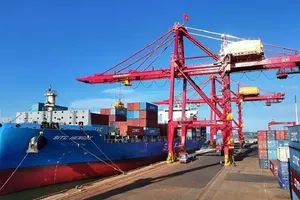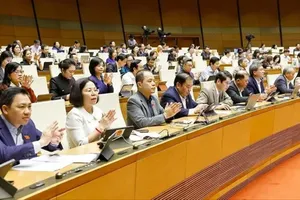
In the first quarter of 2024, the Consumer Price Index (CPI) of Vietnam increased by 3.77 percent compared to this time last year, while the core inflation rate also saw a rise of 2.81 percent.
Head Nguyen Thu Oanh of the Prices Statistics Department (under the General Statistics Office – Ministry of Planning and Investment) first mentioned possible factors that can lead to inflation increases. The war between Russia – Ukraine and the one at Gaza Strip as well as the unstable status at the Red Sea are all affecting the global inflation when several supply chains are disrupted.
Moreover, input material prices in the world are rather high, causing negative influences on Vietnam, which are importing a large quantity of materials for manufacturing. This means inevitably higher end-product prices in the country. Adding to that is an exchange rate increase between USD and VND, also resulting in more pressure on commodity prices in Vietnam as it obviously affects the prices of imported materials as well as other balances.
At present, the State is responsible for adjusting service prices like healthcare and education, taking into account all factors and fees to perform those services. Furthermore, Vietnam Electricity might increase energy prices when those of input materials (petrol, oil) are still high. These also contribute to raising the CPI.
The last factor is the upcoming salary reform and base salary growth in July, which are expected to lead to commodity price rises.
A closer look at the monthly statistics reveals an upward trend in the average CPI growth rate. the programs to support economic recovery and to disburse public investment capital will, to some extent, put pressure on the price level.
Therefore, it is necessary to closely monitor and promptly adopt flexible administration solutions in order to boost economic growth while stabilizing the national macroeconomy.
Discussing the proposal of Minister of Planning and Investment Nguyen Chi Dung about selecting the alternative of 6.5-percent GDP rise at the recent Government meeting and its effects on different inflation scenarios, Ms. Oanh said that this GDP rise is equal to an annual CPI growth rate of 4-4.5 percent, the same as the target approved by the National Assembly.
When talking about the recommendation of the General Statistics Office to the Government in the price management task, she suggested that the Steering Committee on Price Management of the Government should direct relevant ministries and state agencies to carefully prepare a report on the measures to increase prices of essential commodities normally under the control of the State (electricity, fuel, healthcare and education services), including both the specific time and rise rate.
This will make these increases more synchronous and suitable while avoiding being passive in promulgating and implementing price policies, both ensuring inflation control in 2024 and achieving the goals set by the National Assembly.
Also, the Government as well as related ministries, state agencies, and local authorities should carefully monitor product prices and inflations in the world to timely deliver warnings for proper solutions to cope with bad situations and ensure sufficient material supply for stable commodity prices in the country. Meanwhile, it is necessary to maintain a smooth flow of merchandise distribution, especially fuel and other key goods that are normally affected by disruptions in global supply chains and geopolitical tensions in the world.

Measures should be adopted to suitably administrate the trade and delivery of essential commodities, particularly at the end of the year to minimize abnormal price increases. More importantly, strict sanctions must be carried out to punish law breaking activities related to price control.
The Government needs to continue implementing its monetary policy proactively, flexibly, and carefully alongside with its fiscal policy and other macroeconomic policies in order to control inflation according to the set targets.
Finally, there must be more information updates to the public to ensure transparency and consensus in the Government’s task of price management so that consumers feel at ease and inflation is successfully stabilized.
Deputy Minister of Finance Nguyen Duc Chi informed that in the upcoming time, his ministry is going to continue monitoring the economic and inflation statuses in the world to promptly deliver consultations about policies and scenarios for flexible price management, especially the essential commodity prices that normally have great effects on others. Sensitive times like national holidays and Tet holiday or after salary reform and base salary increase are the focus to timely handle any law offenses related to prices.
The two ministries of Finance and Industry and Trade are working together to flexibly control fuel prices so that these prices are parallel to the global counterparts. The Petroleum Price Stabilization Fund will be used wisely to contribute to controlling inflation and help manufacturing activities of the community.
Deputy Governor of the Vietnam State Bank Dao Minh Tu shared that the main reason leading to an exchange rate rise between USD – VND is a quick growth of the USD in the world. Also, the policy to strongly decrease deposit interest rates in Vietnam lately causes VND interest rate to be lower than the one of USD in the interbank market, resulting in more pressure on this exchange rate. Finally, in the past three months, there were positives in imported goods, and thus a higher demand for foreign currency for imports.
This exchange rate rise not only affects the value of money and purchasing power of the Vietnamese but also influences current policies to stabilize the macroeconomy and inflation control, investor confidence. Therefore, the Government aims to continue managing this rate flexibly to ensure the stability, harmony, and sufficiency of foreign currency for legal requirements of the national economy. In addition to the general monetary policy management tool that the Vietnam State Bank is implementing, in case of necessity, the Vietnam State Bank must still intervene to ensure stability.
Deputy Minister of Industry and Trade Phan Thi Thang affirmed that her ministry is collaborating with relevant ministries, state agencies, and local authorities to monitor the market and ensure sufficient essential commodities to serve the public. Her ministry is also providing consultation for the price management process of all commodities whose prices are controlled by the Government to control inflation.
The Ministry of Industry and Trade timely updates information to the community on the supply sources to make consumers feel more at ease while trying to handle any misleading news that might create havoc to the market.
























